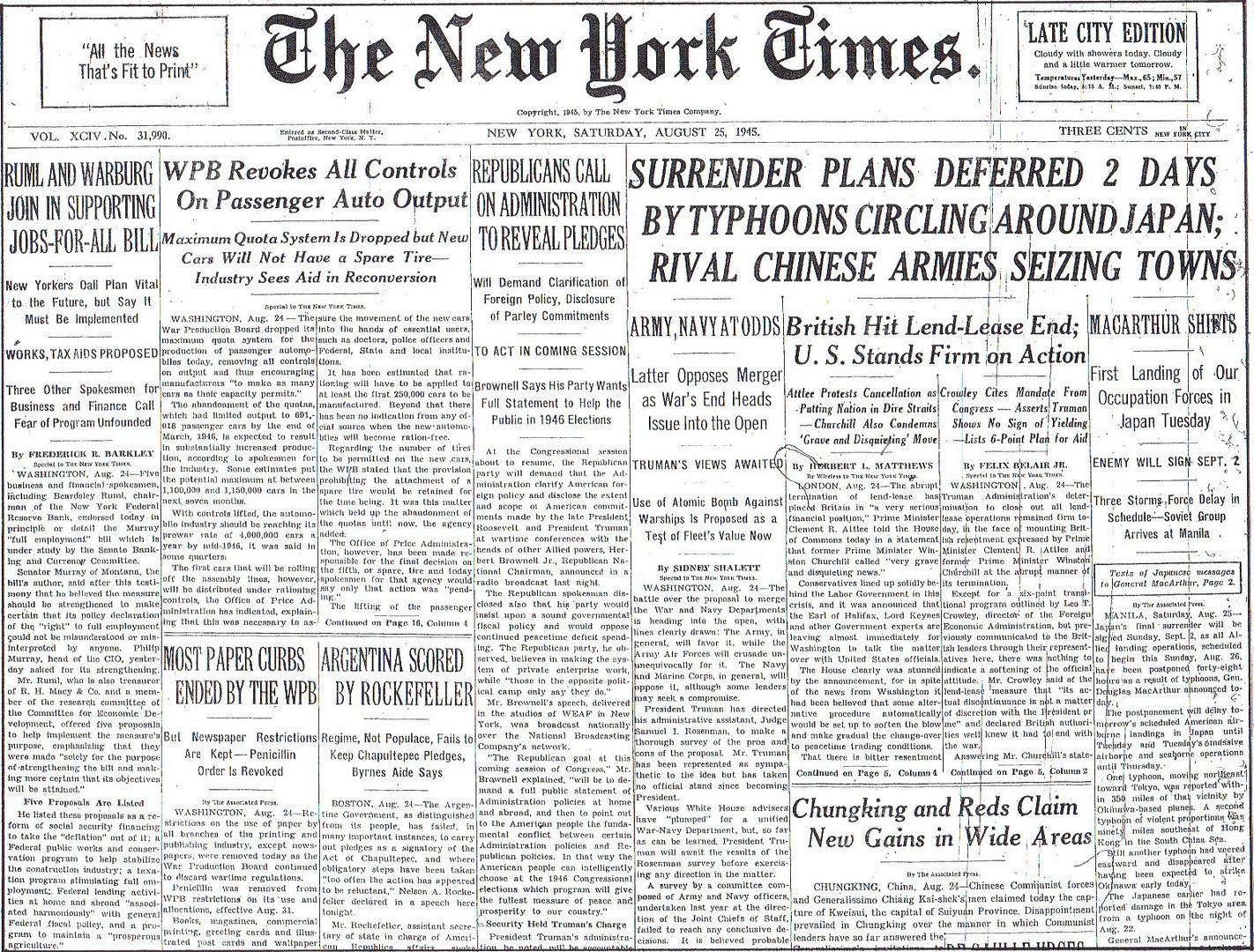
Posted on 08/25/2015 4:54:59 AM PDT by Homer_J_Simpson

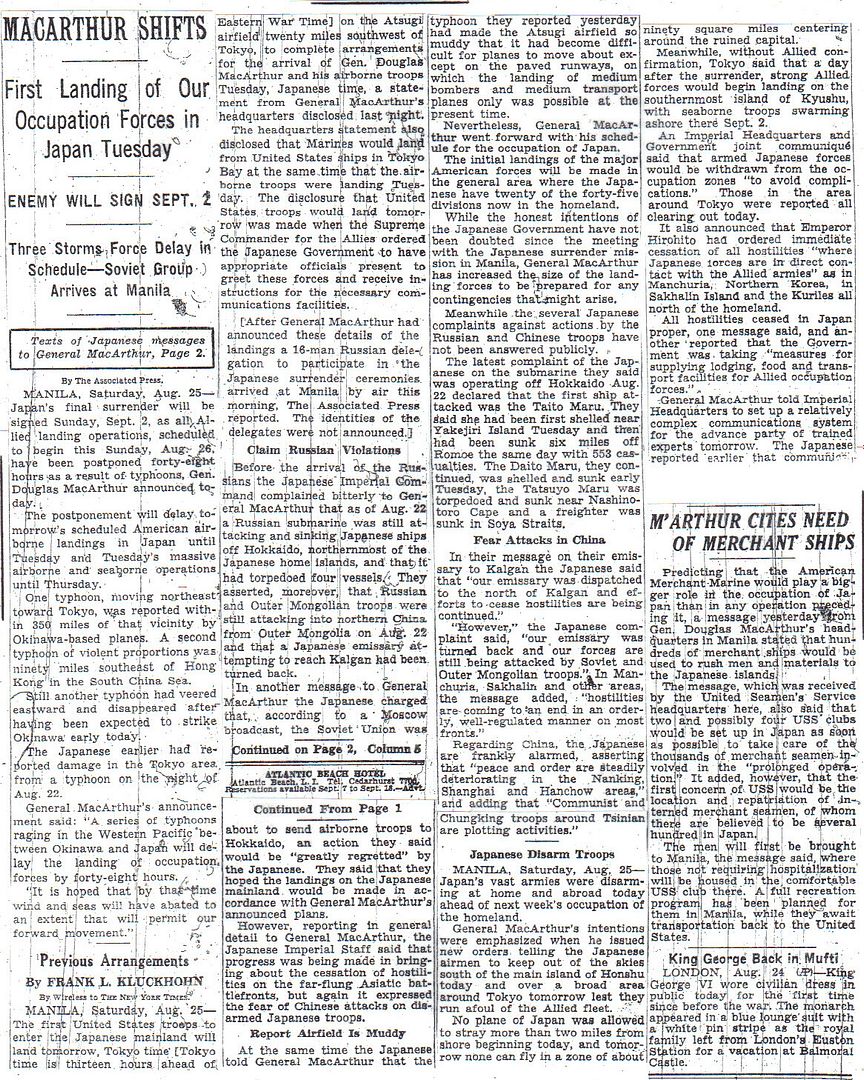
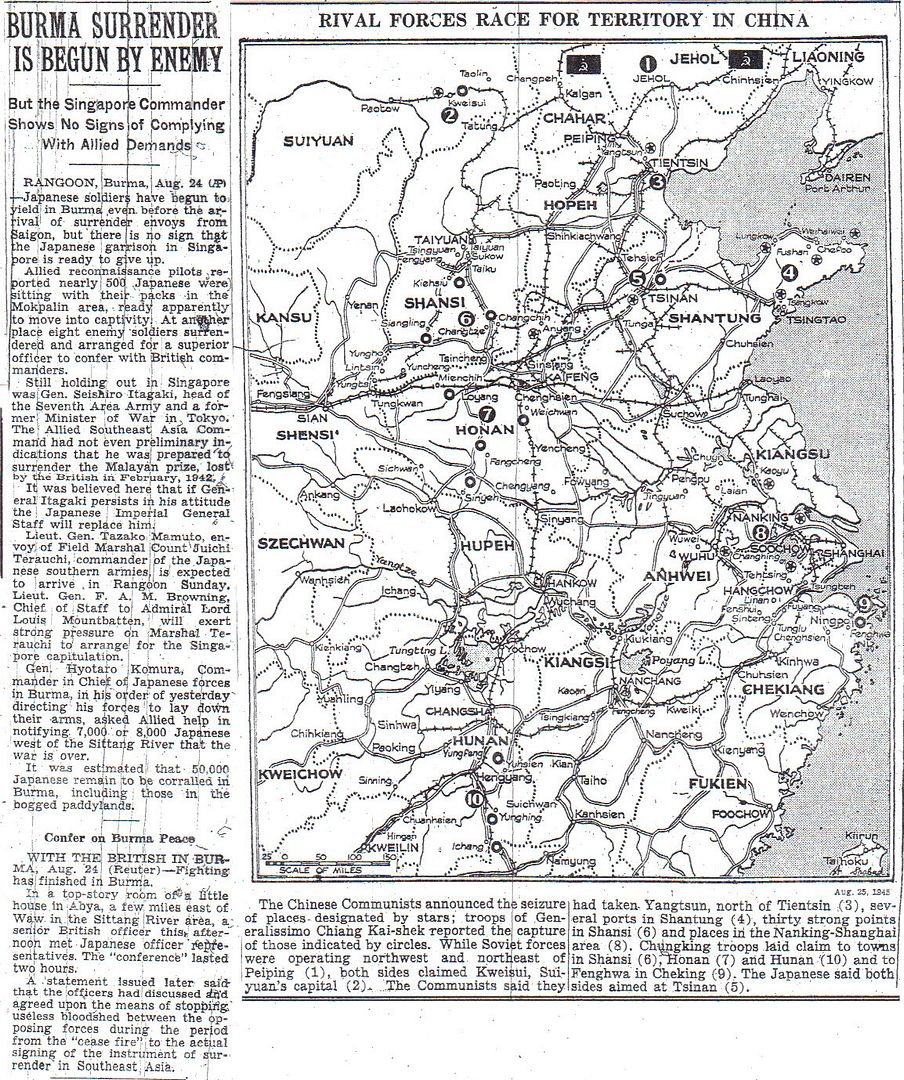
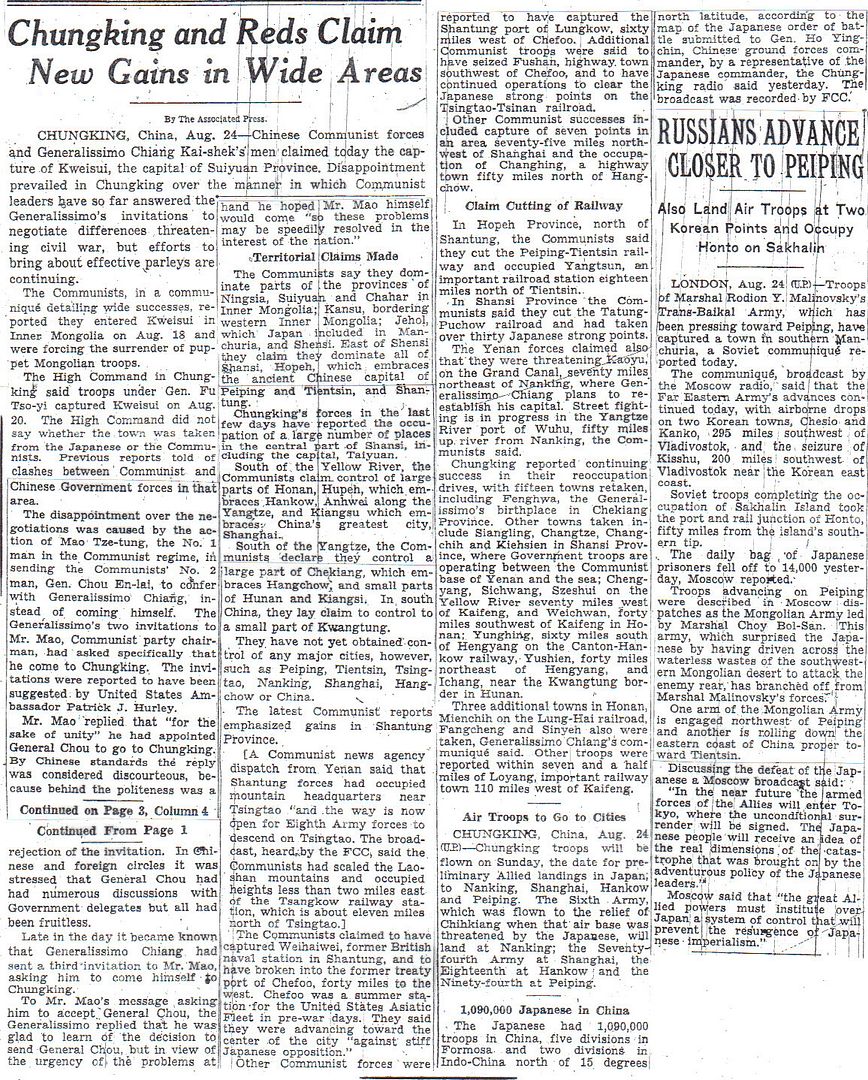
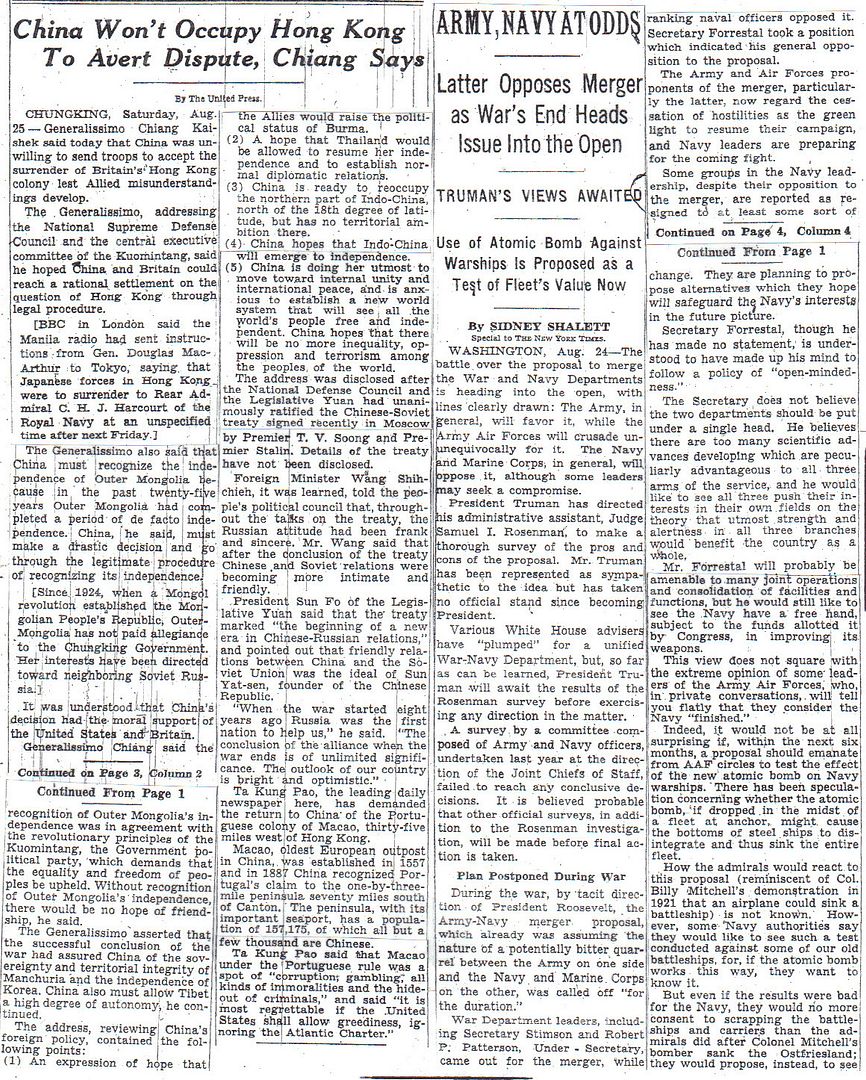
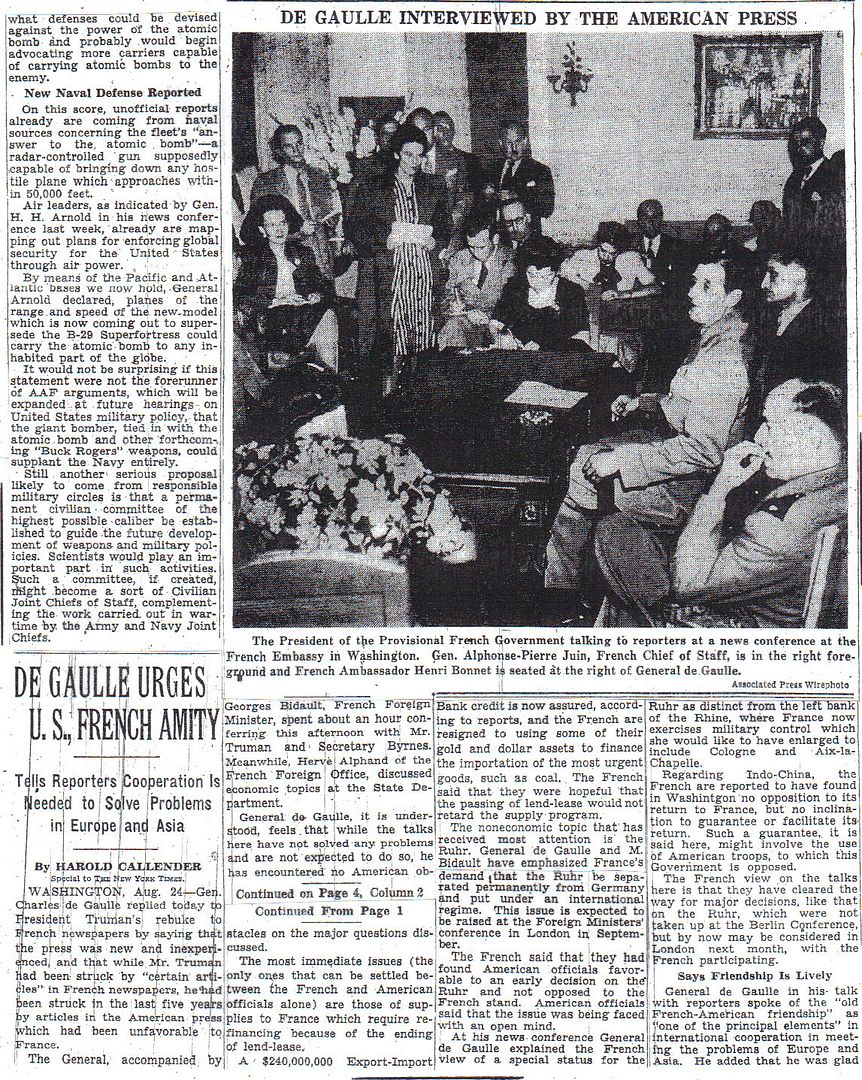
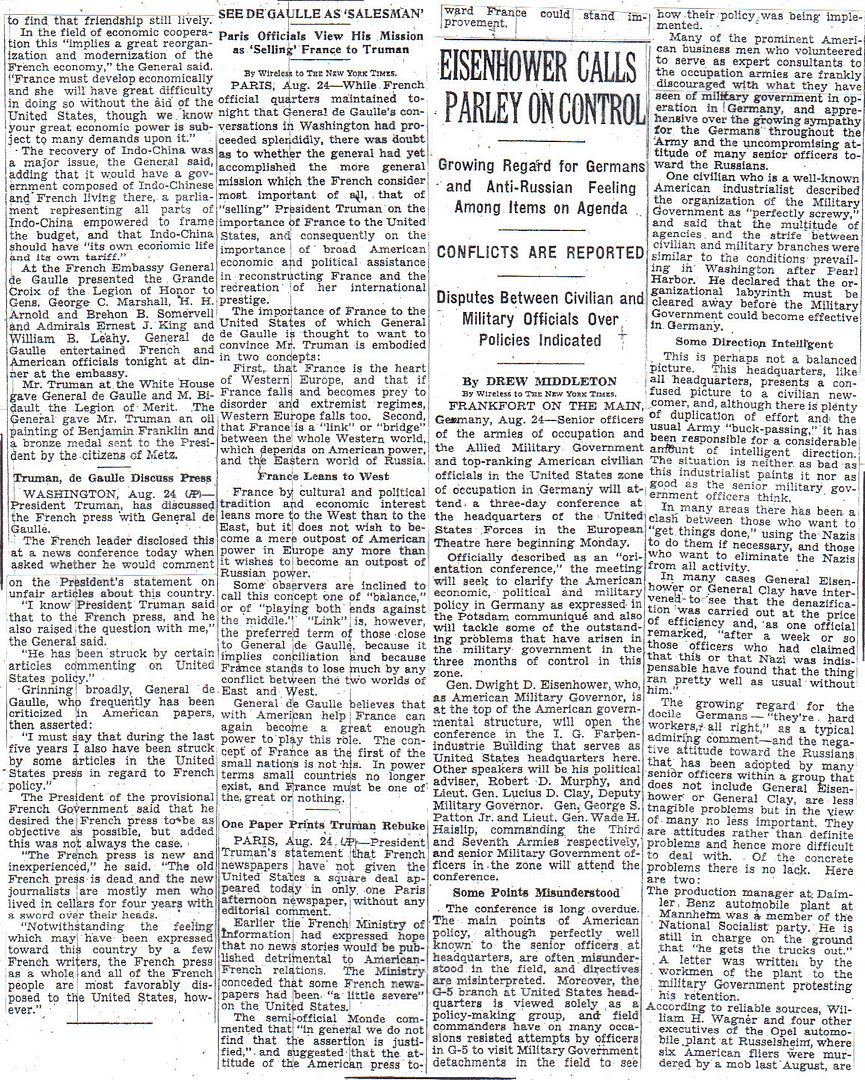
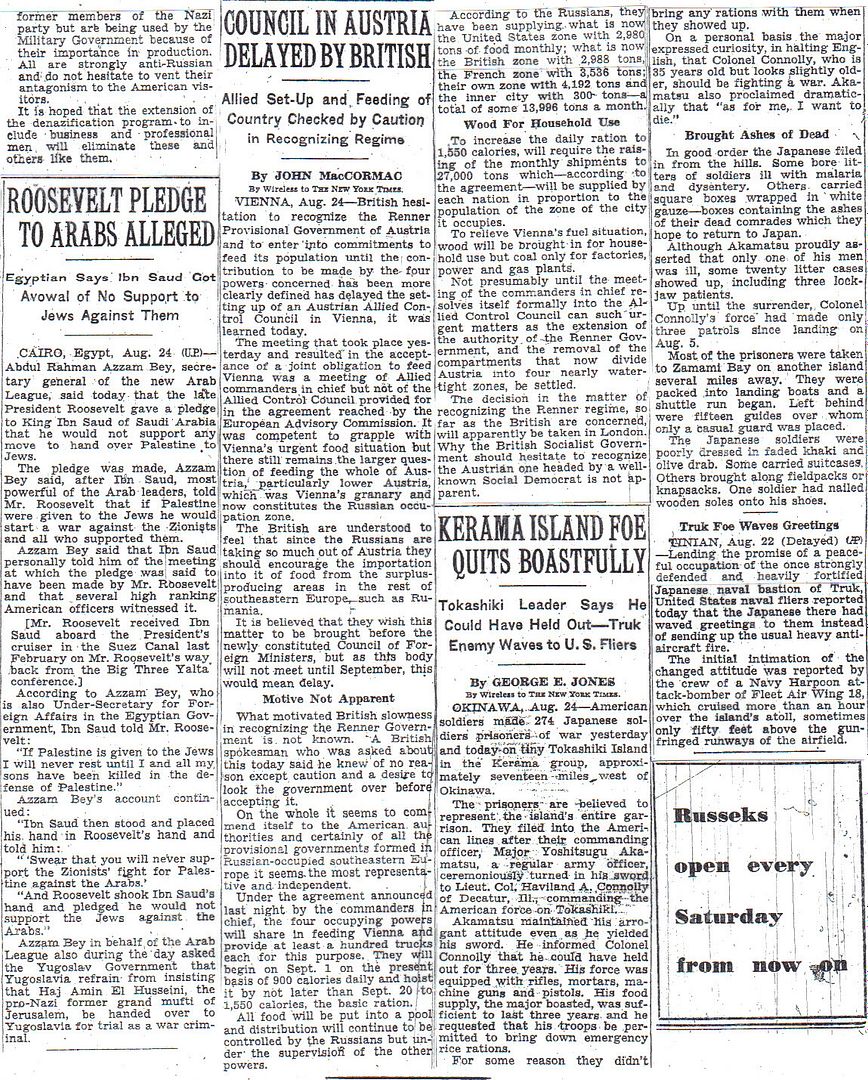
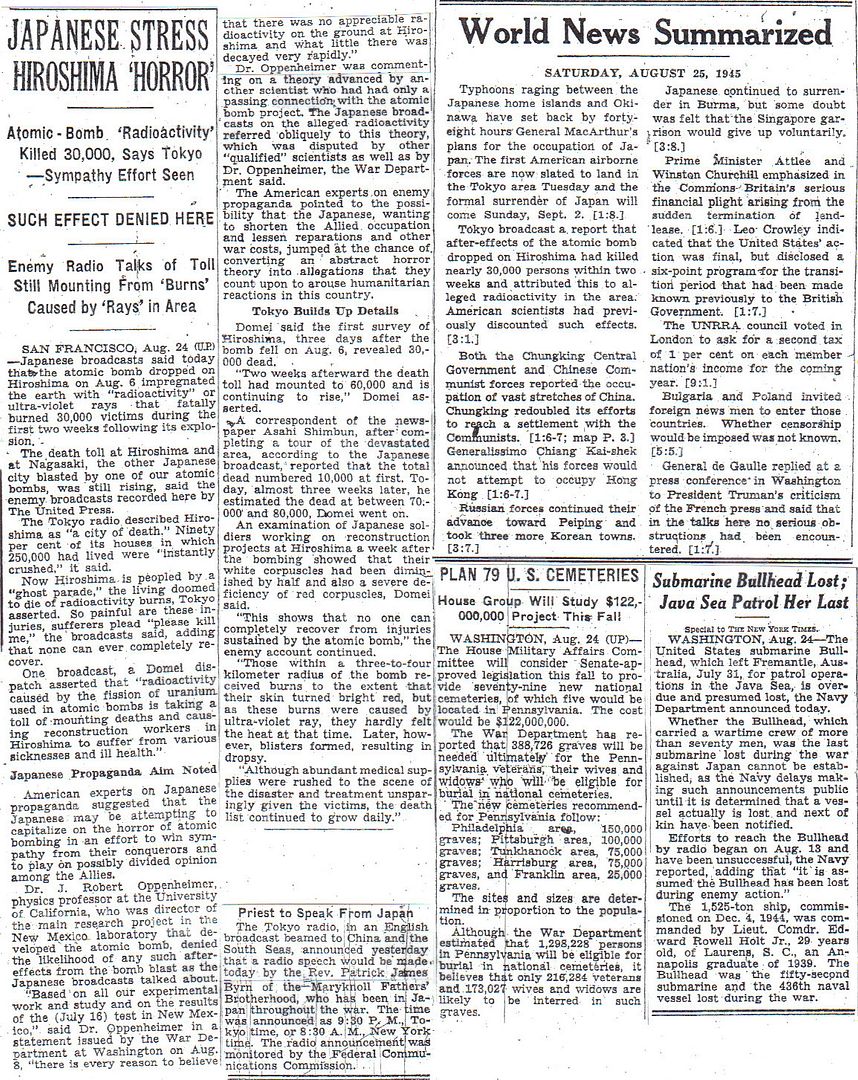
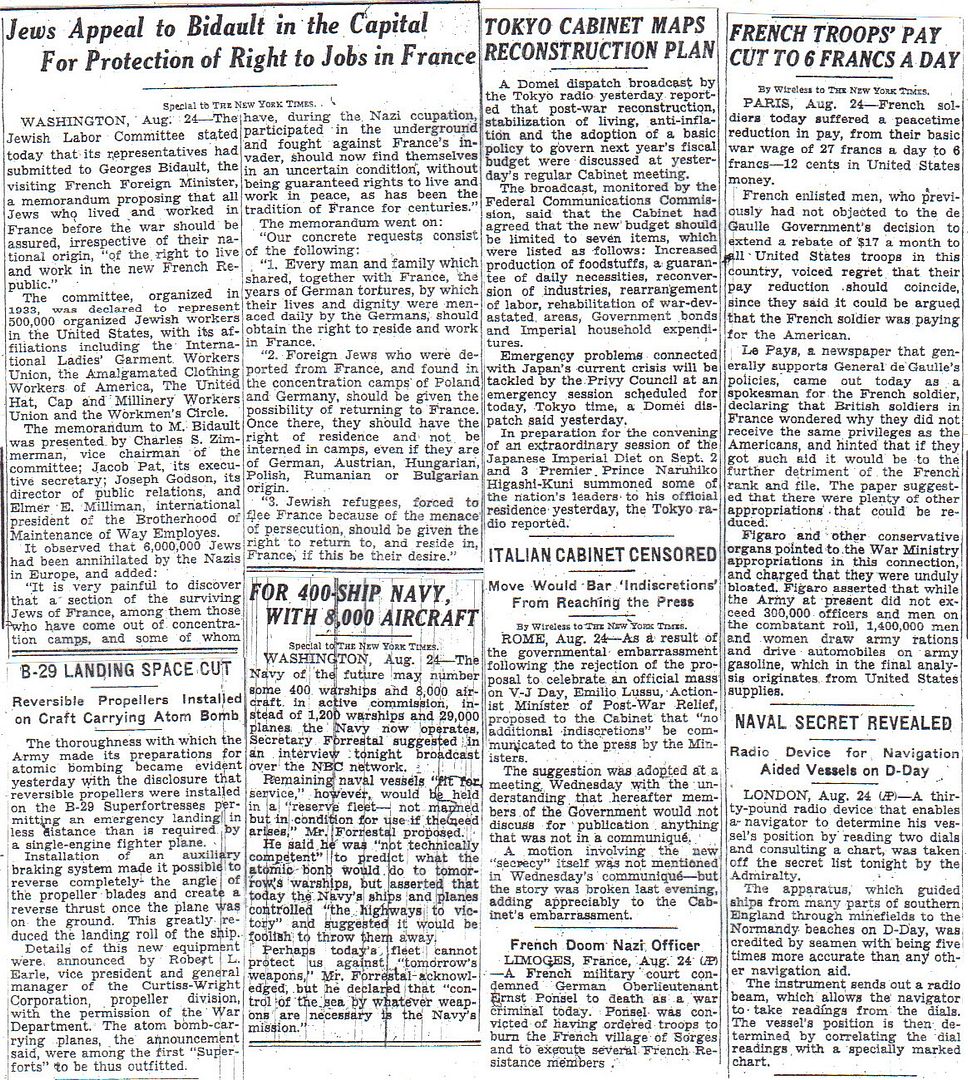
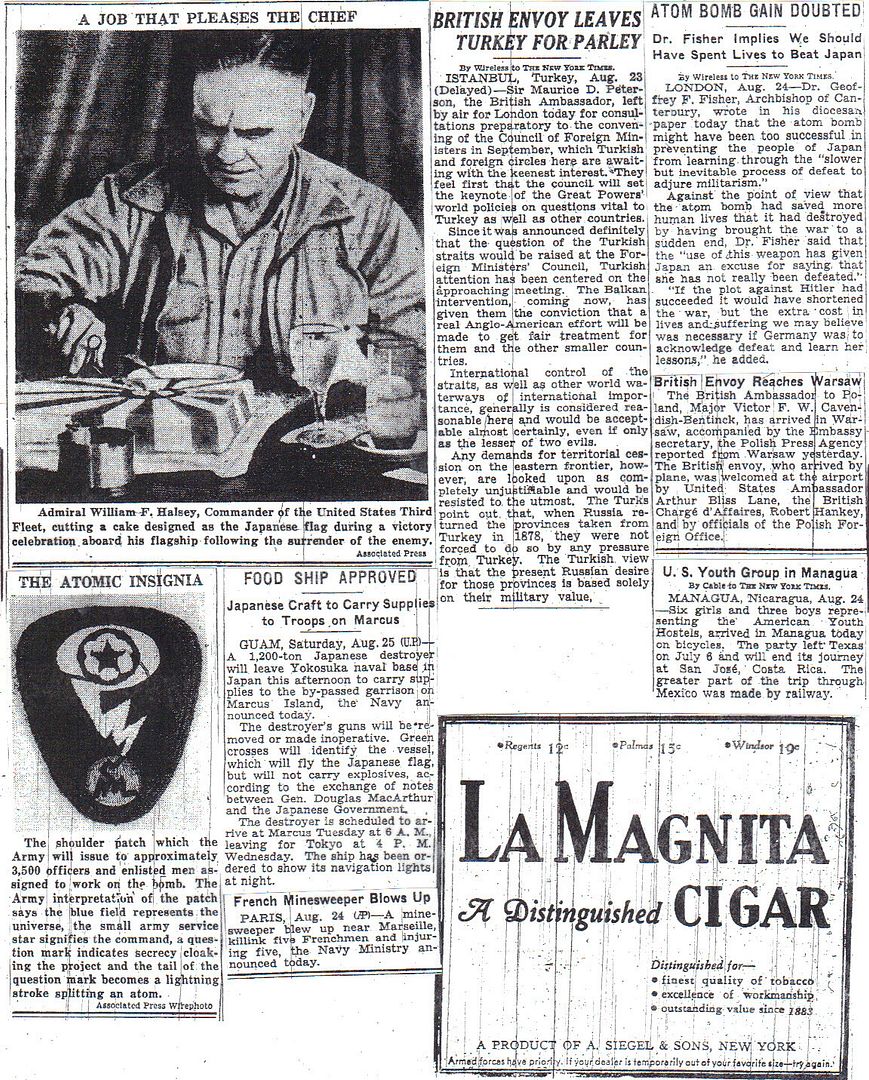
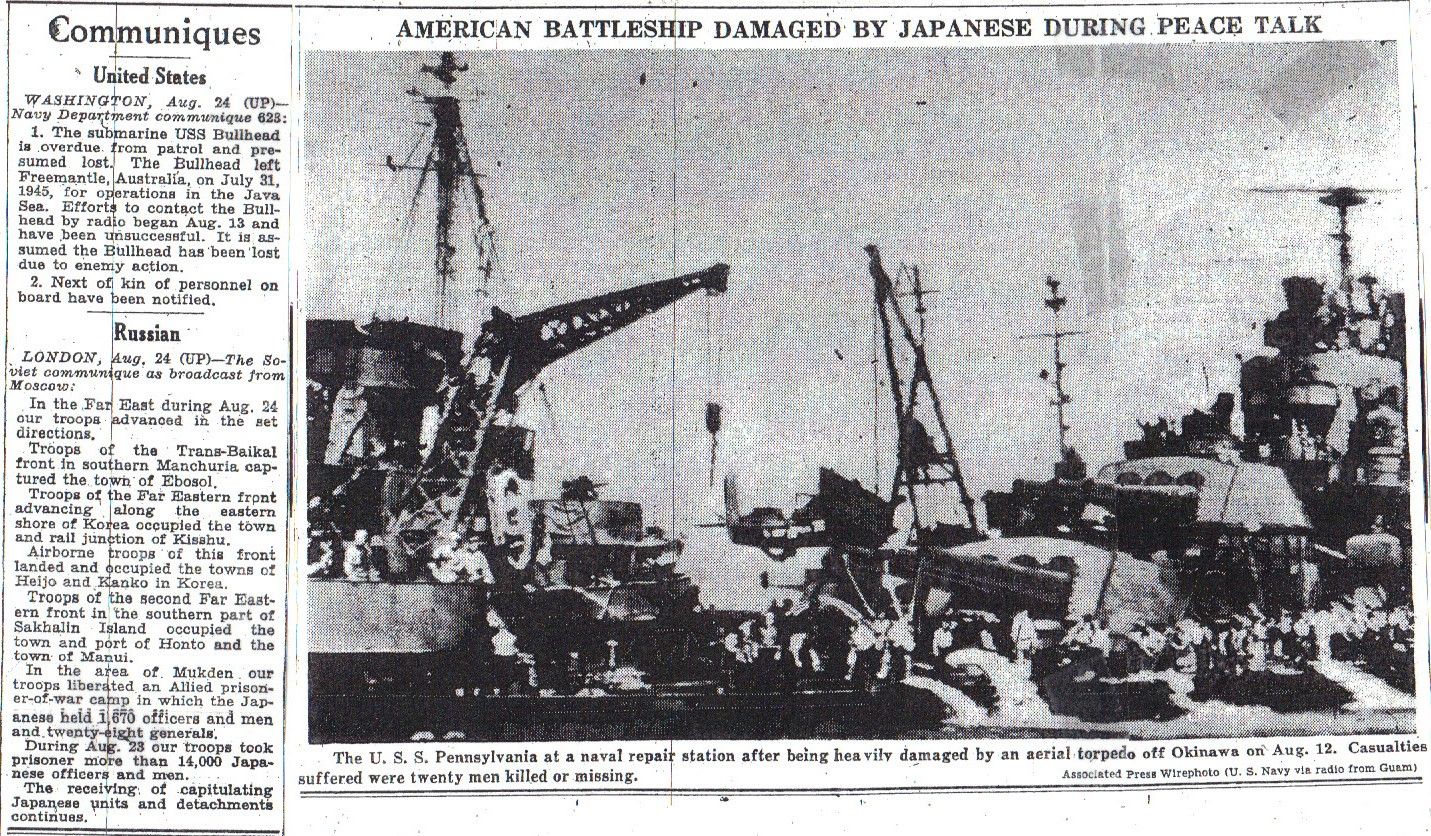
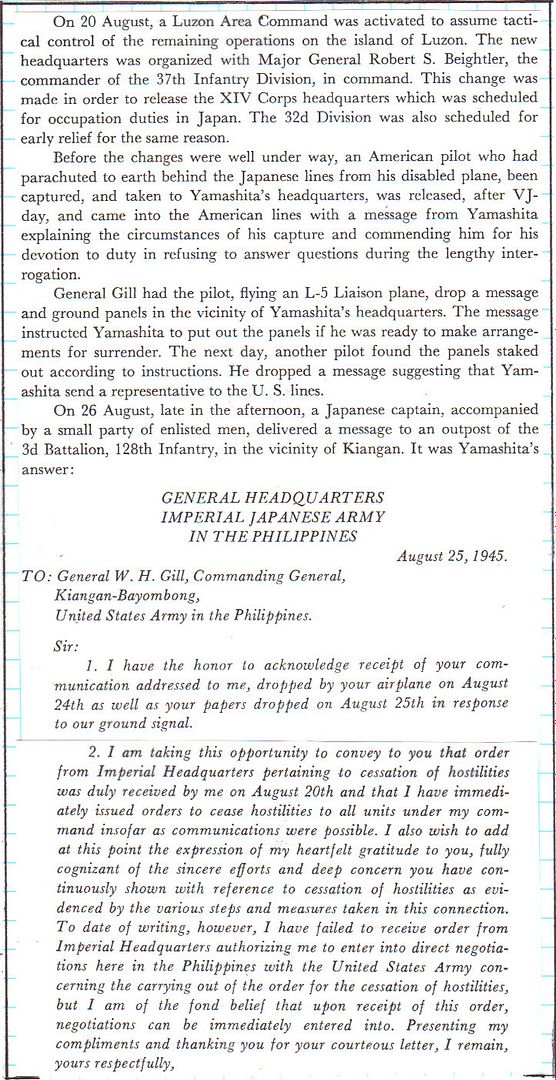
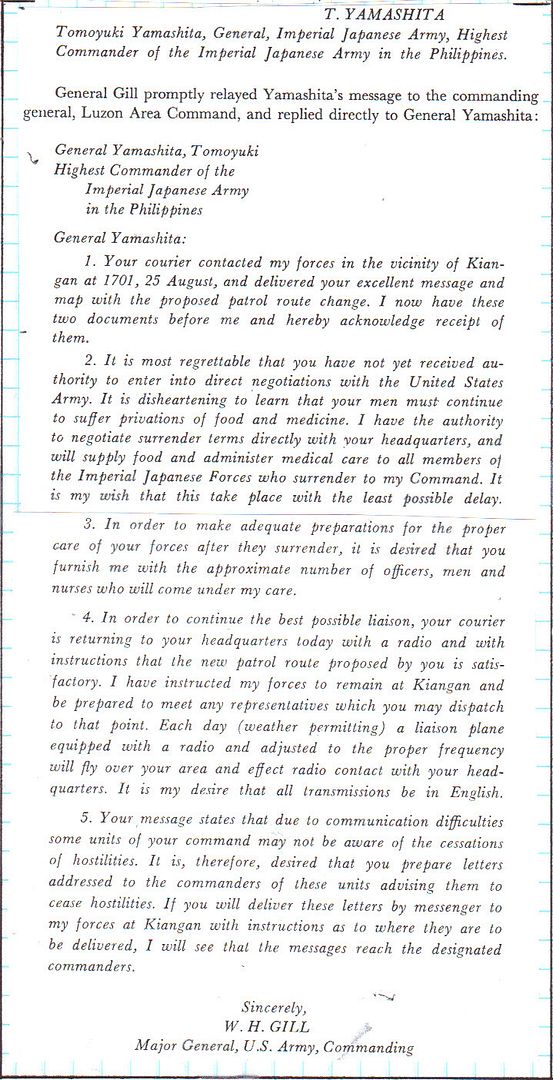
Major General H.W. Blakeley, USA, Ret., 32d Infantry Division World War II
#1 - “On the Atchison Topeka & Santa Fe” - Johnny Mercer, with the Pied Pipers
#2 - “Till the End of Time” - Perry Como
#3 - “Chopin’s Polonaise” - Carmen Cavallaro
#4 - “Gotta Be This Or That” - Benny Goodman
#5 – “If I Loved You” – Perry Como
#6 – “Tampico” – Stan Kenton, with June Christy
#7 – “Sentimental Journey” – Les Brown, with Doris Day
#8 – “On the Atchison Topeka & Santa Fe” – Bing Crosby
#9 – “On the Atchison Topeka & Santa Fe” – Tommy Dorsey, with the Sentimentalists
#10 – “I’m Gonna Love That Gal” – Perry Como
http://www.etherit.co.uk/month/7/25.htm
August 25th, 1945 (SATURDAY)
UNITED KINGDOM: The new prime minister, Clement Attlee, is tonight preparing to warn the nation to brace itself for a long period of unprecedented peacetime austerity. Shortages of food and much else will be more acute than during the war.
Britain faces its gravest-ever financial crisis as a result of President Truman’s sudden cancellation of US Lend-Lease four days ago. Under this mutual aid programme, begun by President Roosevelt in 1941, Britain has been getting food imports without cash payment.
It was stated grimly in Whitehall that on account of the American action there must be immediate reductions in imports of food, cotton, tobacco, petrol and many manufactured goods. Also, things produced in Britain for home consumption will increasingly be reserved for export. A high-level British delegation will leave for Washington next week in a bid for transitional arrangements to ease the situation. US diplomats pointed out that the president was obliged by American law to end Lend-Lease as soon as the war was over. They also said that Britain can now probably now get a massive new American loan. This buttered no parsnips in Whitehall.
Mr. Churchill is known to share Mr. Attlee’s concern that the president acted without prior consultation. They see the crisis as a bitter legacy caused by having almost to bankrupt the nation in the effort to win the war.
London: The war may be over, but many problems are just beginning. That is the bleak view that the British government conveyed to the House of Commons this week. It sees a world where the difficulties go deeper than the inevitable detritus of warfare, refugees and devastated cities.
Ernest Bevin, the new British foreign secretary, said last Monday that economic reconstruction was the primary objective of foreign policy. Not just overseas, though: reports published in Britain this week stated that 700,000 houses in London alone needed repairs from bomb damage. And the next day economic problems came closer to home for Britain when President Truman abruptly cancelled the Lend-Lease programme which had sustained Britain during the war. “Very grave and disquieting,” was the verdict of Winston Churchill, now the opposition leader, for the move implies severe shortages of food and prolonged rationing.
Britain’s political leaders are also united in foreboding about the prospect of the USSR establishing subservient communist satellites in eastern Europe. Mr. Bevin spoke of uncertainty over promises of free elections in Poland and “one kind of totalitarianism being replaced by another” in Bulgaria, Romania and Hungary. Nor is the advance of communism confined to Europe. In China, with Japan defeated, there have been warnings this week from the Communists, led by Mao Tse-tung, to the Nationalists, led by Chiang Kai-shek, not to provoke a civil war.
Yet potentially dwarfing all this was a report on Wednesday from the Japanese News Agency that the numbers dying daily from burns caused by the atomic bombings is still increasing. It now seems that the bombs caused far more deaths through radiation than scientists had predicted.
GERMANY: British forces in Germany are redesignated the British Army of the Rhine.
BURMA: Rangoon: The war in Burma effectively ended before Japan announced it intention of surrendering, but next week it becomes official. Lt-Gen Takazo Numata, the chief of staff to the ailing Field Marshal Count Terauchi, Japan’s Southern Army commander, is to fly here from Saigon to surrender formally. Britain’s Twelfth Army under Lt-Gen Montagu Stopford thwarted attempts by General Honda’s Thirty-third Army to escape across the Sittang Bend towards Malaya three weeks ago; since then there has been only sporadic fighting, with isolated Japanese units unaware of the emperor’s call to “endure the unendurable.”
CHINA:
For no apparent reason, John Birch, an American missionary before the war and an Army captain during the war. is killed by the Chinese communists. Birch, a Baptist missionary in China when the war started, was commanding an American Office of Strategic Services team when ordered to halt by Communist troops. A scuffle ensued and Birch was shot dead. In the 1950s, Robert Welch created a right-wing anticommunist organization named the John Birch Society.
Shanghai: The liberation of China by its people has become a desperate race between the rival Nationalist and Communist forces. Generalissimo Chiang Kai-shek’s Kuomintang troops today entered Shanghai and Nanking, the pre-war capital, as Communist forces were reported to be marching on both cities.
A Kuomintang dispatch claims that Nationalist troops had occupied western Shanghai. But Communists claim that 50,000 Chinese workers are occupying factories in Shanghai and putting up posters to welcome Communist forces.
At Nanking, where Chiang wants to re-establish his capital, Kuomintang troops have accepted the Japanese surrender with Communist troops three miles from the city. In the south the Communists claim to be advancing in Canton and near Hong Kong, and are close to Tientsin in the north.
At government level discussions between the two groups have reached stalemate. The Communist leader Mao Tse-tung refuses to answer Chiang’s appeal to come to Chungking for discussions. Mao counters by offering Chou En-lai as his representative.
FRENCH INDOCHINA: As the Japanese surrendered to the Allies, the Communist Viet Minh under Ho Chi Minh aimed to take power. Due to Emperor Bao Dai’s Japanese associations, Ho Chi Minh was able to persuade him to abdicate today, handing power to the Viet Minh, an event that greatly enhanced Ho’s legitimacy in the eyes of the Vietnamese people. Bao Dai was appointed “supreme advisor” in the new government in Hanoi, which asserted independence on 2 September 1945.
COMMONWEALTH OF THE PHILIPPINES: General YAMASHITA Tomoyoki, Commander of the 14th Area Army, informs the commander of the US 32d Infantry Division that he has ordered all Japanese troops in the Philippines to lay down their arms.
JAPAN: There are reports of large numbers of people “committing hara-kiri before the Imperial Palace in Tokyo.”
In the Kurile Islands, Soviet troops occupy Paramushiru Island. USN PB4Y-2 Privateers continue their photographic missions over Onekotan, Shasukotan and Harumukotan Islands.
In Japan, carrier-based USN aircraft begin daily patrols over airfields and attempt to locate and supply POW camps. This operation continues until 2 September.
Two 7th Fighter Squadron P-38 Lightnings, one flown by Lieutenant Colonel Clay Tice, Jr., Commanding Officer of the 49th Fighter Group based at Motuba Airfield on Okinawa, lands at Nittagahara on Kyushu at 1205 hours local. The second aircraft was low on fuel and could not return to Okinawa.
The two had been part of a six-plane element flying over Japan. At 1305 hours, the American were contacted by officers and men of the IJA and although conversation was difficult, they were greeted in a friendly manner. Prior to landing, Colonel Tice had contacted an SB-17 Flying Fortress of the of the 6th Air Sea Rescue Squadron and advised him of the situation. The SB-17 landed at approximately 1315 hours and with a fuel pump and hose furnished by the Japanese, the Americans transferred approximately US 260 gallons (984 liters) of gas from the SB-17 to the P-38. The SB-17 and two P-38s took off at 1445 hours and landed on Okinawa at 1645 hours.
CANADA: Minesweeper HMCS Elm Lake launched Sarnia, Ontario.
U.S.A.: US Vice-Admiral Willis Augustus Lee Jr., succumbs to a fatal heart attack while in his launch, returning to his flagship, USS WYOMING (AG-17), off the coast of Maine. (Skip Guidry)
Lee had been Commander, Battleships, Pacific Fleet from April 1943 to December 1944 and then commanded Battleship Squadron Two (BatRon 2) until June 1945. He was sent to the Atlantic to command a special unit researching defenses against the Kamikaze threat. He is buried, with honors, at Arlington National Cemetery.
The seven German POWs convicted of hanging a fellow German submariner in the shower room of Compound 4 at Camp Papago, 8 miles east of downtown Phoenix, Arizona, on 12 March 1944, are executed at Fort Leavenworth, Leavenworth, Kansas.
Destroyer USS Holder launched.
Heavy cruiser USS Macon commissioned.
Submarine USS Cochino commissioned.
bookmark
Use of Atomic Bombs against Warships proposed as a Test of Fleets Value
.............There has been speculation concerning whether the atomic bomb, “if dropped in the midst of a fleet at anchor, might cause the bottoms of steel ships to disintegrate and thus sink the entire fleet.....................would like to see such a test conducted against some of our old battleships, for, if the atomic bomb works this way, they want to know it.
The Army considered the Navy FINISHED because of the possible effects of atomic bombs on ships.
What did they think would happen to airplanes?
These were on the back up bomber. https://www.youtube.com/watch?v=sD-74EfZtoo
5.56mm
major yoshitsugu akamatsu surrenders
http://www.worldwar2database.com/gallery/wwii1336
After the Okinawa operation, representatives from Tenth Army tried unsuccessfully to induce the Japanese commander on Aka, 26-year-old Major Yoshitsugu Akamatsu, to surrender. The Japanese soldiers and sailors were not as stubborn, and most of them escaped from the island and surrendered.
Long read but good general info here on suicide and his role.
https://zcomm.org/znetarticle/compulsory-mass-suicide-and-the-battle-of-okinawa-by-masaaki-aniya/
In 2005 sues for libel:
http://historynewsnetwork.org/article/13809
For no apparent reason, John Birch, an American missionary before the war and an Army captain during the war. is killed by the Chinese communists. Birch, a Baptist missionary in China when the war started, was commanding an American Office of Strategic Services team when ordered to halt by Communist troops. A scuffle ensued and Birch was shot dead.
On August 25, as Birch was leading a party of Americans, Chinese Nationalists, and Koreans on a mission to reach Allied personnel in a Japanese prison camp, they were stopped by Chinese Communists near Xi’an. Birch was asked to surrender his revolver; he refused and harsh words and insults were exchanged. Birch was shot and killed; a Chinese Nationalist colleague was also shot and wounded but survived. The rest of the party was imprisoned but released shortly. Birch was posthumously awarded the Distinguished Service Medal.
Submarine Bullhead Lost
Postwar analysis of enemy records indicated that the Bullhead was ambushed by a Japanese Army plane off Bali on August 6, 1945, at 0835 hours. The pilot of a Mitsubishi Ki-51 “Sonia” dropped two sixty-kilogram bombs on the submarine. The pilot claimed two direct hits and said he saw oil and bubbles coming from the area where the submarine had submerged. The Bullhead was the last U. S. submarine lost during World War II.
Interesting wording: “This buttered no parsnips in Whitehall.”
One of the most poignant passages of Churchill's history is reciting a very candid letter to Roosevelt describing in detail how Britain was broke and unable to continue the war on a cash basis. IIRC, Roosevelt was on a ship and spent a lot of time re-reading the letter and thinking. His brainstorm was Lend-Lease. I suppose Truman was privy to none of that history, but suddenly cutting off aid meant some hard years for Britain.
For a time the Brits carried the torch of Western Civilization all alone and in my opinion deserved some consideration for that.
Made acute by their turn to the bleak existence of socialism.
Parsnips are horrid, with or without butter.
EternalVigilance: Made acute by their turn to the bleak existence of socialism.
CS Lewis' biography frequently documents his keen appreciation, post-war, of food often mailed to him in Great Britain from appreciative Americans.
Disclaimer: Opinions posted on Free Republic are those of the individual posters and do not necessarily represent the opinion of Free Republic or its management. All materials posted herein are protected by copyright law and the exemption for fair use of copyrighted works.